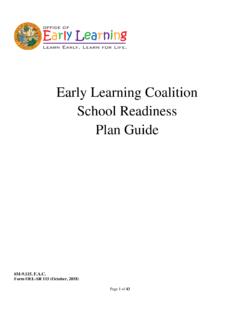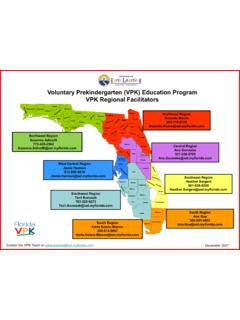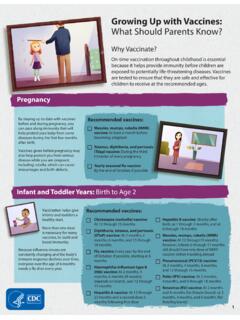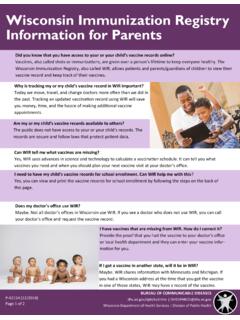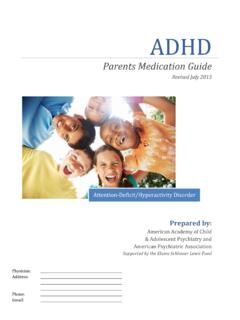Transcription of Voluntary Prekindergarten Handbook
1 VPK Handbook What is Voluntary Prekindergarten ? Voluntary Prekindergarten (VPK) is a state program designed to prepare every child in Florida for kindergarten and build the foundation for their educational success. VPK gives each child an opportunity to perform better in school and throughout life with quality programs that include high literacy standards, accountability, appropriate curricula, substantial instruction periods, manageable class sizes and qualified instructors. All eligible children are entitled to participate in one of three VPK program options. The VPK mission is to ensure that all children are intellectually, socially, emotionally and physically ready to enter school and ready to learn, fully recognizing the crucial role of parents as their child s first teacher.
2 Program Highlights + High-quality educational program with an early literacy focus. + Free for all children 4 years old on or before Sept. 1 who reside in Florida. + parents whose children are born from Feb. 2 through Sept. 1 of a calendar year may choose to enroll their child in VPK either that year or the next when their child is 5. + Parent choice is a priority, so both private providers and public schools participate. 1 Choosing a VPK Program Parent choice is a VPK priority. There are different program options and educational settings such as family child care homes, private centers, public schools, faith-based programs and specialized instructional services providers.
3 All providers must meet VPK program and quality standards. parents choose the program and setting that best fit the needs of their family. Parent choice is a VPK priority. Program Options parents may choose one of three VPK program options. School-year program 540 hours of instruction with class sizes of no more than 20. Summer program 300 instructional hours and class sizes no more than 12; children may participate in VPK the summer before the school year the child will attend kindergarten. VPK Specialized Instructional Services Certified or licensed professionals provide instruction or therapy in individual or small group settings for eligible children with special needs.
4 The child must have a current individualized educational plan (IEP) from a local school district. Services vary based on the program you select. VPK providers choose the structure for the hours per day and days per week to meet the instructional hours required. 2 Finding a VPK Program Resources to help you decide which is the best program 1. Visit the Department of Children and Families (DCF) website to view profiles for each VPK provider you are considering. 2. Contact your local early learning coalition. Coalitions work in all Florida communities to implement early learning support services and have more information about VPK. You can find coalition contact information on the Office of Early Learning website on the map or by calling 866-357-3239 (TTY:711).
5 3. View a copy of the profiles of each VPK provider and school in your county at your local early learning coalition. 4. Contact your local Child Care Resource and Referral office to receive a customized list of VPK providers in your area that meet the needs of your family. You can also get information about other community resources. CCR&R services are free to anyone residing in or seeking early learning services in Florida. For the number of your local CCR&R, please call the Office of Early Learning toll free at 1-866-357-3239 (TTY: 711). 3 What to Expect from VPK Program Guarantees VPK is free for eligible children. Providers are not permitted to charge a registration fee or require you to agree to any additional services or wraparound services as a condition of enrolling in VPK.
6 State law does not, however, prohibit a provider from charging fees for programs or care that is not part of the VPK program ( , late charges, field trips, extended care or wraparound care). If field trips are part of a VPK day, providers may request that a parent contribute, but cannot require them to do so. The provider must also have an alternative activity for a child who does not attend a field trip. VPK programs guarantee the following: 1. An approved VPK program with no cost for the VPK hours of operation. 2. Participation in school-year, summer or specialized instructional services program. 3. The choice of paying for extended day services or wraparound care if the VPK provider you choose offers it.
7 Wraparound care is any care the provider offers in addition to regular VPK hours. Before finalizing your selection, review the VPK provider s discipline and attendance policies to learn about program policies and practices. 4 VPK Provider Standards VPK providers are required to meet the following standards: Private providers must have a director with a VPK director credential. Private providers must be licensed (child care, family child care home or large family child care home); be exempt from licensure (certain private schools or faith-based providers); or be accredited by an approved accrediting association. Specialized instructional services providers must be licensed or certified professionals.
8 Check with your local early learning coalition for more detail. parents may contact the coalition to confirm if a provider offers VPK. VPK Class Standards Teacher qualifications are important for delivering high-quality instruction. VPK instructors must meet minimum education standards. The ratio of instructor to children also indicates quality. When deciding, parents should ask potential providers about teacher qualifications and classroom requirements. VPK programs must employ qualified VPK instructors and meet minimum classroom requirements, including Every lead VPK instructor must at a minimum have a Child Development Associate (CDA) Credential for the school-year program or a bachelor s degree or higher in certain education- related fields for the summer program.
9 VPK classroom ratios must be one instructor to every 11 children in the school-year program and one to 12 in the summer. VPK class size must not exceed 20 children in the school-year program. VPK class size must not exceed 12 children in the summer program. 5 Quality Instruction VPK programs must deliver high-quality instruction including A curriculum that is developmentally appropriate with a focus on early literacy skills. A program that prepares children to be ready for kindergarten based on standards adopted by the State Board of Education for use in VPK. To best meet children s needs and prepare them for future school success, VPK curriculum must be age-appropriate and align with state performance standards.
10 Performance standards provide guidelines to teachers about what children should know and be able to do so they can plan instructional activities for young children. The activities involve engaging in child-initiated and teacher-directed play opportunities. When deciding about the best VPK provider for their children, parents should ask about curriculum and planned activities to determine if the program activities meet the guidelines for quality early learning practices. Changing VPK Providers parents may withdraw their children from VPK at any time. They may reenroll their child in another VPK program under specific conditions: parents may apply for extreme hardship reenrollment for eligible children in the summer program if the children have not completed more than 70 percent of the school-year VPK hours.


